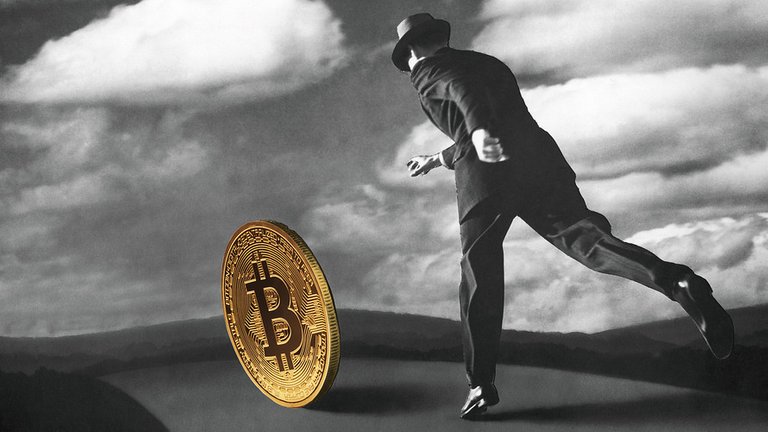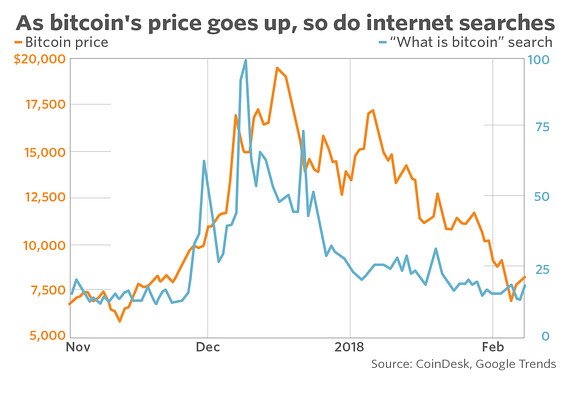
Searches for the definition of bitcoin tend to spike along with the volatile currency’s value

Online searches for the definition of bitcoin tend to spike before its price goes up.
It’s the investment that everyone is talking about — but how many of those investors actually know what it is?
Luckily there’s new help available for people who want to dive into cryptocurrency. The word is now officially in the dictionary, and so is “blockchain” and “initial coin offering,” editors at Merriam-Webster announced Monday.
The three new definitions are among 850 new words and terms that lexicographers added to Merriam-Webster. Other additions included “unicorn” — the term for a startup company valued at $1 billion or more — and, at the other end of the spectrum, “microfinance.’
Americans curiosity about the most well-known cryptocurrency, bitcoin, has seemed to ebb and flow along with its value. Online searches for the definition of bitcoin BTC, -1.54% tend to spike right before the cryptocurrency’s value peaks and trail off when it drops, according to data from Merriam-Webster.com and Google Trends.
Searches for “bitcoin” started to rise on Nov. 25, 2017 and hit an all-time high the week of Dec. 10, 2017, Merriam-Webster Inc. spokeswoman Meghan Lunghi said in February. In early February, searches were down 48% from the December peak.
Those numbers roughly parallel the trajectory of bitcoin’s price, which started a steady climb around Nov. 25, 2017, shot to an all-time high of near $20,000 the week of Dec.10, 2017, and fell to less than half that peak value as of early February, clocking in at about $8,000.
Google Trends tells a similar story. Searches for “what is bitcoin” started surging in late November, hit their all-time high the week of Dec. 3 to Dec. 9, and have fallen off since, dropping to one-quarter of their peak in early February.

Searches for “what is bitcoin” started surging in November 2017.
All told, there was a five-fold jump in lookups for “bitcoin” between November 2017 and November 2016 on Merriam-Webster’s online dictionary, Lunghi said.
Good news: The searches for bitcoin’s definition don’t necessarily mean investors are clueless about the cryptocurrency, said Merriam-Webster’s editor-at-large Peter Sokolowski. “We’re good at reading data, we’re not good at reading minds,” Sokolowski said referring to data about lookups for bitcoin’s definition. “I would never assume to know why a word is being looked up.”
“Curiosity is the opposite of ignorance,” Sokolowski said. “There are a million words that smart people look up. It doesn’t mean they’re ignorant, it means quite the opposite.”
The word bitcoin was first used in 2008 and Merriam-Webster editors added it to the dictionary in early 2016. That’s a very fast timeline, but a typical one for a tech-related word. In the old days lexicographers would sometimes spend decades researching a word before they added it to the dictionary, Sokolowski said. The word “cryptocurrency” was first used in 1990, the same year that “Internet service provider” and “World Wide Web” debuted.
Merriam-Webster’s online dictionary gets 1.25 billion page views a year, and its real-time search data often mirrors terms in the news, from “feminism” to “s***hole.” The latter isn’t in the dictionary yet, but could be soon thanks to the attention it got after President Donald Trump’s comments, Sokolowski said. Princess Diana’s death in 1997 was the first news event that resulted in related lookups, with users searching for “paparazzi,” “cortege” and “princess.”
Other new additions to Merriam-Webster include “narcissistic personality disorder,”“mansplain” and “dumpster fire,” meaning an unmitigated disaster. “The dictionary has become this sort of neutral objective arbiter of the culture,” Sokolowski said.

https://steemit.com/bitcoin/@usaki/best-hashflare-poolsettings-03-06-2018-major-changes
make sure that you didnt miss the best poolsettings for Hashflare